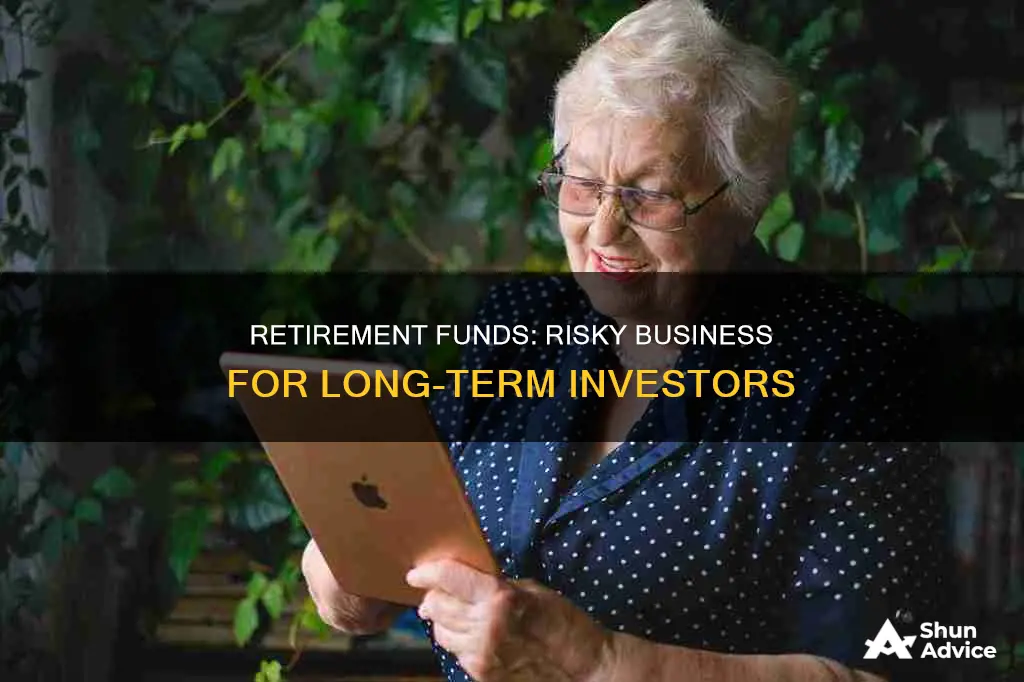
Target-date funds are a popular choice for investors saving for retirement. They are designed to age with you by automatically rebalancing your portfolio from growth investments toward more conservative ones as retirement nears. However, there are several reasons why you might not want to invest in target-date funds. Firstly, they limit investment choices and decisions, usually following a one-size-fits-all strategy. They may also be too conservative near your retirement date, potentially foregoing returns. Fees vary among target-date funds, and they may charge high fees for a glide path that doesn't fit your specific needs. Additionally, they may not take into account market events, your broader portfolio, your situation, or your risk tolerance. Finally, target-date funds do not provide guaranteed income in retirement and can lose money if the stocks and bonds owned by the fund drop in value.
| Characteristics | Values |
|---|---|
| Lack of customisation | Target retirement funds are a one-size-fits-all strategy. |
| Lack of control | Individuals are not actively involved in investment choices. |
| Lack of specialisation | Employees with varying income levels and professions are offered the same plans. |
| Lack of flexibility | Target retirement funds may be too conservative near the retirement date and forego returns. |
| High fees | Fees vary among funds. |
What You'll Learn

Target-date funds may be too conservative near retirement and may forego returns
Target-date funds are designed to become more conservative as retirement approaches, and this can mean that they become too conservative, potentially foregoing returns.
Target-date funds are designed to manage investment risk and to reduce risk over time. As the target date approaches, the investment mix becomes weighted more heavily toward fixed-income or cash equivalent investments, including bonds and treasury securities, which aim for capital preservation and/or income.
However, this shift towards lower-risk investments can mean that target-date funds become too conservative, and this can happen around 10 years before retirement. Research by academics at the University of Illinois at Urbana-Champaign and MIT found that target-date funds start becoming too conservative for most people around the age of 50. They found that a typical upper-middle-class couple without access to family wealth should put 80% of their portfolio in stocks at age 45 and then decline to a steady 60% at and during retirement. In contrast, target-date funds tend to have a 50% stock holding at retirement, declining to 30-40% in later years.
This shift towards conservative investments may mean that target-date funds are not suitable for investors who are happy to take on more risk in exchange for higher returns.
Choosing a Fund: Key Factors for Smart Investing
You may want to see also

Fees vary among funds
Fees vary among target retirement funds, so it is important to be aware of all the fees associated with any fund you invest in. The cost of a mutual fund is known as its expense ratio, an annual fee expressed as a percentage of your investment. The higher the fees, the more costs can erode total returns. The average target-date fund had an expense ratio of 0.52% in 2020, according to research from Morningstar. But these fees can range from as low as 0.1% to more than 1.5%, so there’s room to shop around.
For example, the Vanguard Target Retirement 2050 Fund (VFIFX) has an expense ratio of 0.08%, while the Fidelity Freedom 2050 Fund (FFFHX) is 0.75%. Investors could achieve a similar level of diversification by owning four separate Fidelity index funds at a fraction of the cost. The total annual expense ratio fees for these four funds would amount to 0.16%—just over one-fifth of the cost of the Fidelity Freedom 2060 Fund.
The difference in price often revolves around whether the fund leans on cheaper passive investing strategies or more costly actively managed accounts. The Vanguard Target Retirement Funds average expense ratio is 82% less than the industry average.
Smart Ways to Invest $1000 in Mutual Funds
You may want to see also

Individuals are not actively involved in investment choices
One of the disadvantages of target retirement funds is that individuals are not actively involved in investment choices. While this hands-off approach is beneficial for those who do not want to be involved in the nitty-gritty of investing, it can also be a drawback for those who want more control over their investment decisions.
Target-date funds are designed to simplify retirement investing by providing a diversified portfolio of stocks and bonds that automatically adjusts its asset allocation as an individual gets closer to retirement. The fund's managers gradually shift the asset allocation from more aggressive investments to more conservative ones based on the individual's target retirement age. This means that individuals do not need to actively choose which stocks or bonds to invest in or when to buy and sell them.
According to Vanguard, investors in target-date funds are four to five times less likely to engage in trading and active account management than other investors. This lack of active involvement can be beneficial for those who do not have the time, interest, or knowledge to actively manage their investments. It can help keep individuals disciplined in their investment choices and prevent them from making emotional decisions.
However, this also means that individuals may not be able to seek advice or make changes to their investment strategy as they get closer to retirement. Target-date funds are often criticised for becoming too conservative too early, which may cause individuals to miss out on significant equity gains. Additionally, individuals with varying income levels and professions are offered the same plans, which may not align with their specific retirement needs and goals.
While target-date funds can be a convenient and straightforward option for retirement investing, individuals who want more control over their investment choices may find the lack of active involvement limiting. It is important for individuals to understand the pros and cons of target-date funds before deciding whether to invest in them.
Best Banks for Mutual Fund Investments in Pakistan
You may want to see also

Target-date funds may be too broad
Target-date funds are designed to be a "one-size-fits-all" investment solution. However, this means that they may not be tailored to an individual's specific needs and circumstances. According to Morningstar research, roughly 60% of target-date fund offerings are off-the-shelf, and 80% of target-date fund assets are managed by just five companies. This lack of customisation can be problematic because the retirement savings needs of individuals can vary significantly depending on their income, age, and other factors.
For example, consider two individuals with different incomes but the same planned retirement age. The first individual works in retail sales and earns a salary of $38,000, while the second individual works in finance and earns $81,000. According to Morningstar, at age 65, 46% of the target-date fund for the first individual will be invested in equities, while for the second individual, this number is only slightly higher at 47%. This small difference in equity investment may not adequately account for the difference in their incomes and retirement savings needs.
Additionally, target-date funds may not be well-suited for individuals who want more control over their investment choices and decisions. These funds typically limit investment choices and decisions, and individuals are not actively involved in choosing the specific investments within the fund. While this can be beneficial for those who want a hands-off approach to investing, it may be too broad and restrictive for those who want a more active role in managing their investments.
Furthermore, target-date funds may not always provide the appropriate level of risk for investors. While these funds generally become more conservative as the target retirement date approaches, they may become too conservative too early or too late for some individuals. Research has shown that target-date funds often start becoming too conservative for most people around the age of 50. However, the appropriate level of risk depends on various factors, such as an individual's age, financial situation, and risk tolerance, which can vary significantly from person to person.
In conclusion, while target-date funds offer a simple and convenient way to save for retirement, they may be too broad and inflexible to meet the unique needs of all investors. It is important for individuals to carefully consider their own circumstances and goals when deciding whether to invest in target-date funds.
Money Market Funds: Where to Invest for Smart Returns
You may want to see also

Target-date funds can be too conservative
Research by academics at the University of Illinois at Urbana-Champaign and MIT found that target-date funds start becoming too conservative for most people around the age of 50.
The research found that a typical upper-middle-class couple without access to family wealth should put 80% of their portfolio in stocks at age 45, then decline to a steady 60% at and during retirement.
Target-date funds do a good job of stock ownership for a while, with a typical 75% equity allocation at age 50, but they become too conservative thereafter, with a 50% stockholding at retirement, declining to 30-40% in later years.
This is supported by a study from Vanguard, which found that younger investors were investing only around 89% of their assets in stocks, which is considered pretty low. The average longer-date target-date fund stakes around 93% in stocks.
The two biggest target-date fund managers, Vanguard and Fidelity, start with 90% in stocks, a more cautious approach than the average.
With this in mind, it's important to remember that the biggest advantage of target-date funds is that they handle the challenging task of optimising your asset allocation and rebalancing your investment holdings. While there are downsides, for many investors, the convenience probably outweighs the disadvantages.
Luxembourg Funds: Why Investors Should Consider This Option
You may want to see also
Frequently asked questions
Target-date funds are a one-size-fits-all strategy that limit investment choices and decisions. They may be too conservative near your retirement date and therefore forego returns. They also vary in fees, and you may be able to achieve a similar level of diversification by owning separate index funds at a fraction of the cost.
Target-date funds may be too conservative near your retirement date and therefore forego returns. They also vary in fees, and you may be able to achieve a similar level of diversification by owning separate index funds at a fraction of the cost.
Target-date funds do not provide guaranteed income in retirement and can lose money if the stocks and bonds owned by the fund drop in value. They are also subject to interest rate, credit, and inflation risk.







